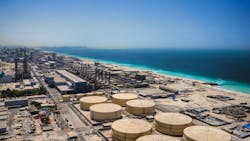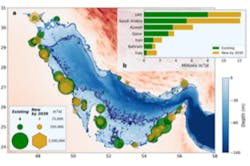Study: Rising desalination won’t significantly affect Arabian Gulf
As the use of desalination in drinking water treatment will continue to rise around the Arabian Gulf, a new study predicts that the growing amounts of hypersaline brine won’t bring significant environmental effects to the Gulf in the coming decades.
The study comes from a team of researchers from New York University Abu Dhabi’s (NYUAD’s) Arabian Center for Climate and Environmental Sciences and Water Research Center, who studied how the increased use of desalination technologies in combination with projected climate change might affect Gulf-wide salinity in the future.
The nations bordering the Arabian Gulf are the world’s largest users of desalination technologies to meet their freshwater needs. With growing amounts of hypersaline (high-salt) brine being released into the Gulf, and it has been unclear what effect this will have on the Gulf’s marine ecosystems and fisheries. In the paper titled Long-term, basin-scale salinity impacts from desalination in the Arabian/Persian Gulf, published in Scientific Reports, the researchers found that, even under a worst-case climate change and projected desalination scenario, salinity increases will be well within the range of natural salinity variation due to evaporation.
A key finding was that any increase in salinity would drive a corresponding increase into the flux through the Hormuz strait, resulting in a more rapid renewal of the Gulf waters. As a consequence, even in extreme-case scenarios, basin-scale salinity increases are not projected to exceed a level that will have a significant impact on the Gulf’s marine life, such as flora and fauna, as these levels of salinity increase are well within the natural range of variability that organisms in the Gulf are already exposed to.
While other modelling studies have attempted to estimate the increase of salinity at basin-wide scales due to desalination, this is the first model of its kind to also consider the possible future effects of climate change. As the Gulf region is home to the biggest desalination plant complexes in the world and 45 percent of global freshwater desalination production, it is important to consider the long-term effects of this industry. The data gathered regarding the anticipated levels of salinity in the Gulf coastal waters can guide the future study of the other effects of widespread desalination, such as the economic impacts of changes to the fishing industry.
“The Gulf is a naturally extreme marine system, and we have been utilizing a growing fraction of its waters for desalination purposes. This raises concerns about whether this may have ecological consequences, particularly in this era of a rapidly changing climate,” says John Burt, Co-Principal Investigator at the NYUAD Water Research Center and the Arabian Center for Climate and Environmental Sciences.
“The results of this work show that salinity increases under even the worst-case climate projections and increased desalination in coming decades are likely to have only negligible impacts on salinity at the Gulf-wide scale, and well within the normal seasonal variation in salinity that organisms here are already exposed to. While we need further research on processes occurring at more localized scales around desalination plants, these results suggest that there is little cause for concern of salinity increases at the Gulf-wide scale.”

